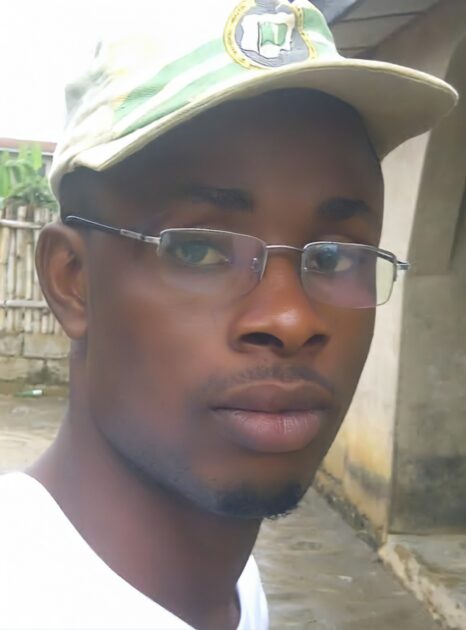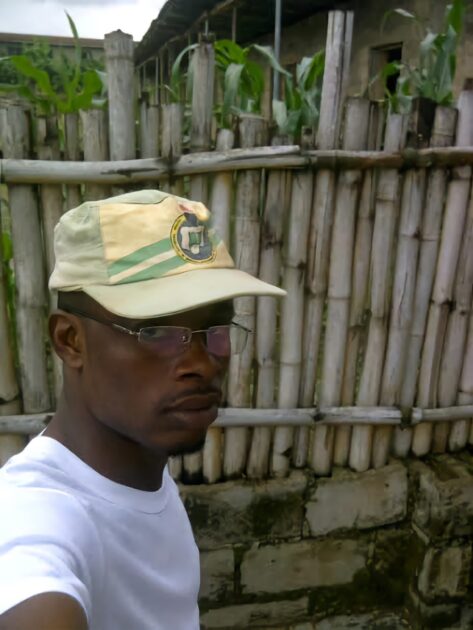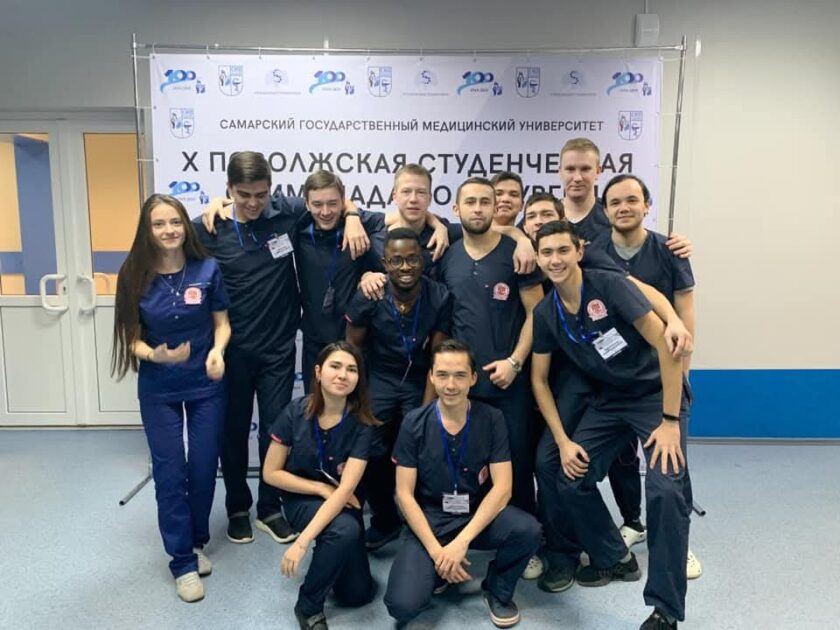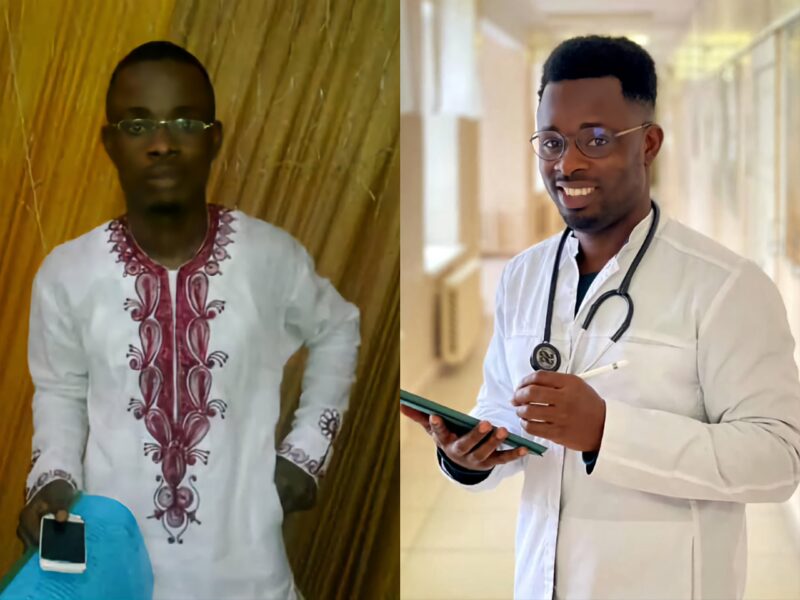Samuel Olalekan Akinyemi is a Nigerian-born doctor who once worked as a labourer on construction sites before traveling abroad to further his studies. His recent involvement in the discovery of a groundbreaking cancer vaccine in Russia marks a milestone in his career and in the global fight against cancer.
Dr. Samuel Olalekan Akinyemi (born in 1994) is a 30-year-old oncologist at the Ufa Clinic of the Bashkir State Medical University. His journey is a testament to determination, resilience, and dedication to education. From the streets of Lagos to global medical achievements, Dr. Samuel Akinyemi’s life story is one of remarkable transformation.
Early Life in Nigeria
Dr. Akinyemi was born in Lagos, Nigeria (unverified). He attended United Methodist/Anglican Grammar School for his secondary education and completed his National Youth Service Corps (NYSC) in Nigeria in 2012.


He initially pursued his undergraduate studies in civil engineering inspired by his father’s profession. However, he was always drawn to medicine. He completed his National Youth Service Corps (NYSC) in Nigeria in 2012 before moving to Russia in 2015 to study medicine at Bashkir State Medical University (BSMU) in Ufa.
In his words during an interview with RT:
“I followed in my father’s footsteps into construction, although I always wanted to become a doctor. After finishing my studies at university, I had the opportunity to go to Turkey or Finland. But when I learned about the recruitment of applicants to be sent to Russian medical universities, I realized that this was my chance.”
His parents were very supportive, agreeing to fund his education. He studied Russian for six months in Volgograd under the guidance of a Nigerian curator who was recruiting applicants. There, he studied Russian language for six months.
In interviews, Dr. Akinyemi has expressed gratitude for the support of his parents throughout his educational journey. He enjoys working at the BSMU Clinic due to its modern equipment and supportive colleagues.
During his tenure at the university, Dr. Akinyemi demonstrated a keen interest in urology and oncology, which later became the focal points of his research and professional career. His commitment to these specialties is evident through his numerous publications and contributions to the medical field.
In 2021, Samuel received Russian citizenship.
Samuel Akinyemi: Academic and Professional Career
He pursued his medical studies at BSMU, where he was enrolled from November 3, 2015, to June 30, 2022, specializing in general medicine.
At Bashkir State Medical University, he was also employed ats a Lecturer assistant from 2022-11-01 to 2027-11-01.
On December 13-14 2019, he participated in the 10th Volga Reion Surgery Olympiad 2019 held at the Samara State Medical University where he got 2nd place in the competition “Craniotomy”.

Dr. Akinyemi’s academic career is marked by a focus on oncology and urology. He is currently an assistant at Bashkir State Medical University, where he is involved in both clinical practice and research. He finished his residency on July 11, 2024, and is working as an oncology intern at the BSMU Clinic. In addition to his medical duties, he teaches English at the university and high school. In the summer, he works at language camps for children, where schoolchildren learn English with native speakers. During one of these camps, Akinyemi saved a drowning child.
After completing his medical education, He got employed by Bashkir State Medical University, his expertise span multiple displine within medicine, with a pactical focus on oncology and immunology.
Dr. Akinyemi’s work includes extensive research into cancer treatments and vaccines. He has also published numerous research and article
Dr. Akinyemi is multilingual; he speaks German (Deutsch), Russian, Yoruba, and English.
Community Engagement
Beyond his academic responsibilities,Dr Akinyemi is actively invvolved in church actiities. While in nigeria, he was in the choir and a member of Redeemed Christian Church of God (RCCG) in Nigeria.
Research Contributions of Dr. Samuel Olalekan Akinyemi
Dr. Akinyemi has made significant contributions to medical research, with several publications listed on Google Scholar:
- Medicinal Plants and Sustainable Human Health: A Review
O Akinyemi, SO Oyewole, KA Jimoh (2018) - The Integral Role and Clinical Significance of Metabolic Profiling in Prostate Cancer: A Narrative Review
OSA Valentin Nikolaevich Pavlov, Marat Fayazovich Urmantsev, Marat (2024) - A Secured Mobile Money Transaction Using Data Masking and Enhanced Base64 Algorithm
AM Logunleko, KB Logunleko, OO Lawal, OOD Ezugwu, OS Akinyemi (2021) - Implementation of A Web-Based Museum
OO Akinwunmi, OO Lawal, KB Logunleko, OS Akinyemi - An Empirical Network Performance Monitoring System Applications Software Assessment
AA Dawodu, OO Lawal, KSA Famuyiwa, OS Akinyemi - Students Project Management and Allocation System
OS Akinyemi, AA Dawodu, OO Lawal, AO Adepoju - A Conceptual Approach to Network Effectiveness in Monitoring System
AA Dawodu, AO Adepoju, OO Lawal, OS Akinyemi
Russia’s Breakthrough in Cancer Treatment: Inside the Development of Personalized Vaccines
In a groundbreaking effort to revolutionize oncology, Russia is on the cusp of a significant medical breakthrough with its development of personalized cancer vaccines. These innovative vaccines aim to provide tailored solutions for individual patients, marking a significant shift in the approach to cancer treatment. Pioneered by leading institutions and bolstered by state funding, this ambitious endeavor highlights Russia’s commitment to advancing medical science amidst growing challenges in cancer care.
Neoantigenic Personalized Vaccine: A Tailored Approach
Since 2018, Russian researchers, under the guidance of the Ministry of Health, have been developing a neoantigenic personalized vaccine designed to target the unique genetic profiles of patients’ tumors. This cutting-edge approach has been spearheaded by a coalition of renowned institutions:
N.N. Blokhin National Medical Research Center of Oncology
N.F. Gamaleya National Research Center of Epidemiology and Microbiology
P.A. Herzen Moscow Cancer Research Institute
The vaccine’s innovation lies in its precision. By analyzing the genetic and molecular characteristics of a malignant tumor, scientists can craft a therapeutic agent that “teaches” the immune system to identify and destroy cancer cells while sparing healthy tissue.
Clinical trials for this personalized vaccine are set to begin following the completion of preclinical studies, with the first phase focusing on patients diagnosed with malignant lung cancer, one of the most prevalent cancer types in Russia. In a bid to ensure accessibility, the Russian government has announced that these vaccines will be provided free of charge, despite their estimated cost of 300,000 rubles (approximately $2,869) per dose.
The Role of Major Institutions
N.N. Blokhin National Medical Research Center of Oncology, recognized as the largest oncological clinic in Europe, has been at the forefront of this development. The center’s comprehensive research encompasses tumor biology, mechanisms of carcinogenesis, and tumor progression. This foundational work is critical for crafting vaccines that effectively target individual tumors.
Similarly, the N.F. Gamaleya National Research Center of Epidemiology and Microbiology, known for its expertise in vaccine technologies, has played a pivotal role in adapting adenovirus vector platforms for cancer treatment. These platforms, initially designed for infectious diseases, are now being repurposed to develop anti-cancer therapies. Notable figures such as Alexander Gintsburg, the center’s director, and Elena S. Kolesnikova, a leading researcher in viral vector applications, are central to these efforts.
At the P.A. Herzen Moscow Cancer Research Institute, researchers have focused on personalized mRNA vaccines and oncolytic vaccines, such as EnteroMix, which utilize non-pathogenic viruses to destroy malignant cells and boost immune responses. These efforts are part of a broader strategy to incorporate advanced biotechnological solutions into cancer care. Significant contributors include Larisa Vladimirovna Bolotina, who oversees chemotherapy strategies, and Anton Mikhailovich Zaitsev, known for his work in neuro-oncology.
An Inside Look: The Science Behind the Cancer Vaccine
Russian oncologists have emphasized the complexity and potential of these vaccines. Utilizing mRNA technology, the vaccine trains the body’s cells to produce proteins that mimic those found in cancer cells. These proteins act as signals for the immune system, prompting cytotoxic lymphocytes—specialized immune cells—to target and destroy the tumors.
Dr. Samuel Olalekan Akinyemi played a huge role in this stage as the only foreign robotic surgeon in all of Russia.
Describing the mechanism, Andrey Kaprin, Chief Oncologist of the Russian Ministry of Health, likened one type of vaccine to a “Trojan horse.” In this model, a virus or a killer substance is hidden within a protein transport molecule. Once inside the tumor cell, the “warhead” is activated, either destroying the cell or altering its state.
The second vaccine employs a different approach. Leveraging mRNA technology, cancer cells are extracted from the patient, and their DNA is decoded. Based on this information, a personalized vaccine is crafted to trigger the immune system against that specific cancer type.
Early Trials and Future Prospects
Initial trials have focused on melanoma, one of the deadliest forms of skin cancer. Early results in mouse models have been promising, paving the way for expanded applications to other cancer types. However, experts caution that the path to widespread availability remains long and complex.
Insights from Russia’s Leading Oncologist
In a recent interview, Andrey Kaprin shed light on the broader implications of these vaccines. He noted that while the vaccines are not a universal cure, their personalized nature offers a revolutionary approach to treatment.
“This drug or vaccine directs the patient’s immune system against malignant cells because it carries changes characteristic at the genetic level of tumors,”
Kaprin explained.
Kaprin also highlighted the potential for combining and shortening the phases of clinical trials to accelerate availability. However, he stressed the importance of rigorous testing to ensure safety and efficacy, emphasizing that each vaccine must undergo the standard three-phase trial process, which typically spans several years.
By leveraging AI and advanced vaccine technologies, scientists aim to transform the oncology landscape, providing hope for millions of patients. The journey from research to real-world application may be arduous, but the progress thus far signals a promising future for personalized cancer care.















Join our Channel...